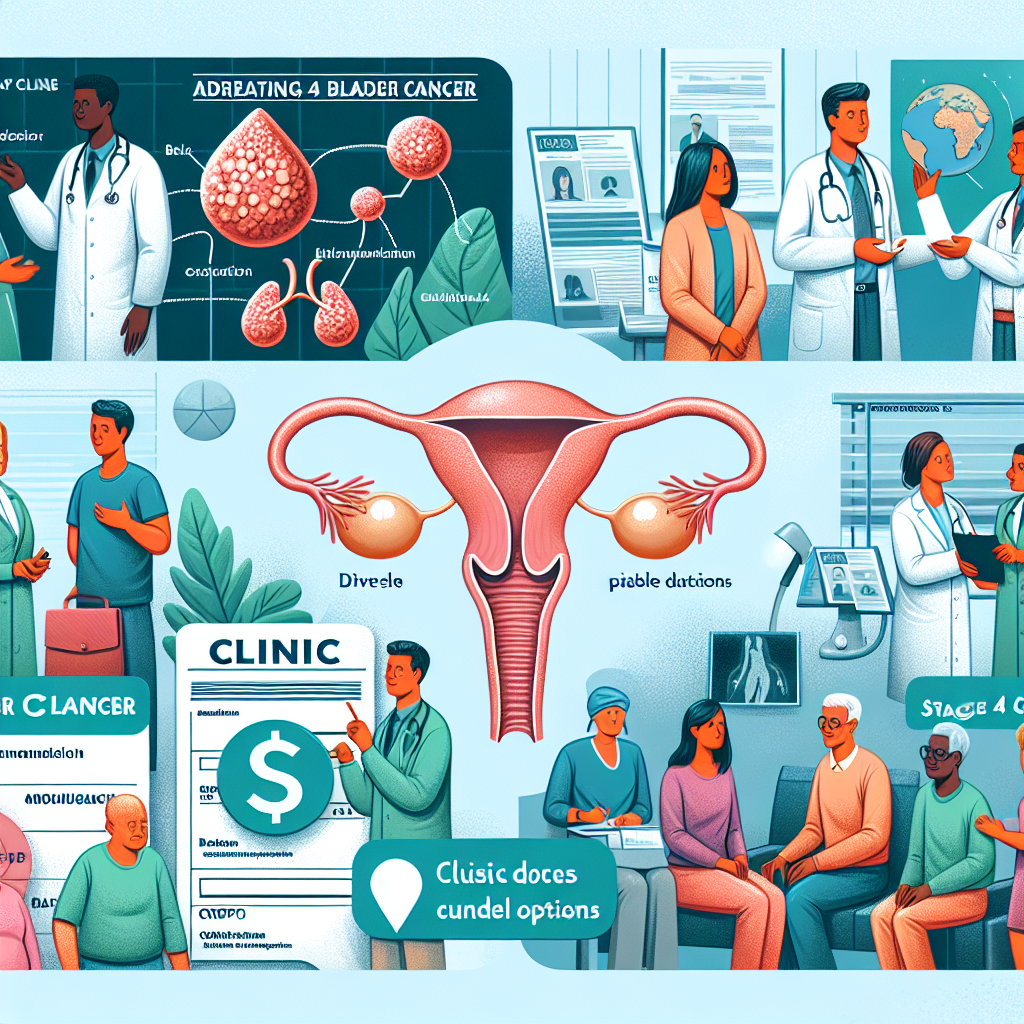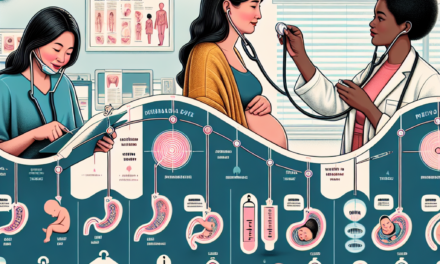Affordable Clinics for Stage 4 Bladder Cancer Treatment: A Guide

Bladder cancer is a significant health concern worldwide, with stage 4 being the most advanced and challenging to treat. For many patients, the cost of treatment can be a substantial barrier to accessing the care they need. This guide aims to provide comprehensive information on affordable clinics for stage 4 bladder cancer treatment, offering insights into treatment options, financial assistance, and patient support systems. By exploring these avenues, patients and their families can make informed decisions about their healthcare journey.
Understanding Stage 4 Bladder Cancer
Stage 4 bladder cancer is characterized by the spread of cancer cells beyond the bladder to other parts of the body, such as the lymph nodes, bones, liver, or lungs. This stage is often referred to as metastatic bladder cancer and requires a multifaceted treatment approach. Understanding the nature of stage 4 bladder cancer is crucial for patients and caregivers to navigate the treatment landscape effectively.
Symptoms and Diagnosis
Stage 4 bladder cancer symptoms can vary depending on the organs affected by metastasis. Common symptoms include blood in the urine, frequent urination, pain during urination, and pelvic pain. As the cancer spreads, patients may experience additional symptoms such as bone pain, weight loss, and fatigue.
Diagnosis typically involves a combination of imaging tests, such as CT scans, MRIs, and PET scans, along with biopsies to confirm the presence and extent of cancer spread. Early and accurate diagnosis is essential for developing an effective treatment plan.
Treatment Options
Treatment for stage 4 bladder cancer often involves a combination of therapies aimed at controlling the disease and alleviating symptoms. Common treatment options include:
- Chemotherapy: Systemic chemotherapy is often used to target cancer cells throughout the body. It can help shrink tumors and slow the progression of the disease.
- Immunotherapy: This treatment leverages the body’s immune system to fight cancer cells. Drugs like pembrolizumab and atezolizumab have shown promise in treating advanced bladder cancer.
- Radiation Therapy: Used to target specific areas where cancer has spread, radiation therapy can help relieve pain and other symptoms.
- Surgery: In some cases, surgery may be performed to remove tumors or relieve obstructions caused by cancer.
- Clinical Trials: Participation in clinical trials can provide access to new and potentially effective treatments that are not yet widely available.
Prognosis and Survival Rates
The prognosis for stage 4 bladder cancer varies depending on several factors, including the patient’s overall health, the extent of cancer spread, and response to treatment. According to the American Cancer Society, the five-year survival rate for stage 4 bladder cancer is approximately 5%. However, advancements in treatment options and personalized medicine are improving outcomes for many patients.
Case Studies: Success Stories
Despite the challenges of stage 4 bladder cancer, there are success stories that offer hope to patients and their families. For instance, a patient who participated in a clinical trial for a new immunotherapy drug experienced significant tumor shrinkage and improved quality of life. Another patient who underwent a combination of chemotherapy and surgery achieved remission and has been cancer-free for several years.
These case studies highlight the importance of exploring all available treatment options and seeking care from experienced medical professionals who specialize in bladder cancer.
Challenges in Accessing Treatment
Accessing treatment for stage 4 bladder cancer can be challenging due to several factors, including the high cost of care, limited availability of specialized clinics, and geographical barriers. Patients may also face difficulties in obtaining insurance coverage for certain treatments or medications.
To overcome these challenges, patients and their families should explore financial assistance programs, seek support from patient advocacy organizations, and consider traveling to clinics that offer affordable and comprehensive care.
Identifying Affordable Clinics for Stage 4 Bladder Cancer Treatment
Finding affordable clinics that provide high-quality care for stage 4 bladder cancer is crucial for patients seeking treatment. This section explores various strategies for identifying clinics that offer cost-effective treatment options without compromising on quality.
Researching Clinics and Treatment Centers
Conducting thorough research is the first step in identifying affordable clinics for bladder cancer treatment. Patients can start by:
- Online Resources: Websites like the National Cancer Institute and American Cancer Society provide directories of cancer treatment centers and clinics across the country.
- Patient Reviews: Reading reviews and testimonials from other patients can offer insights into the quality of care and affordability of different clinics.
- Consulting Healthcare Professionals: Oncologists and primary care physicians can recommend reputable clinics that specialize in bladder cancer treatment.
By gathering information from multiple sources, patients can create a shortlist of clinics that meet their needs and budget.
Evaluating Cost-Effectiveness
When evaluating clinics, it’s essential to consider the cost-effectiveness of their treatment options. Factors to consider include:
- Comprehensive Care Packages: Some clinics offer bundled treatment packages that include consultations, diagnostics, and therapies at a reduced cost.
- Insurance Partnerships: Clinics that have partnerships with insurance providers may offer lower out-of-pocket expenses for patients.
- Sliding Scale Fees: Clinics with sliding scale fee structures adjust costs based on a patient’s income, making treatment more affordable for those with limited financial resources.
Patients should inquire about payment plans and financial assistance programs offered by clinics to further reduce treatment costs.
Exploring International Options
For some patients, seeking treatment abroad can be a cost-effective option. Medical tourism has become increasingly popular, with countries like India, Thailand, and Mexico offering high-quality cancer treatment at a fraction of the cost in the United States.
When considering international clinics, patients should:
- Verify Accreditation: Ensure that the clinic is accredited by recognized international healthcare organizations.
- Assess Quality of Care: Research the clinic’s reputation, success rates, and patient outcomes.
- Consider Travel and Accommodation Costs: Factor in the additional expenses of traveling and staying abroad for treatment.
While international treatment can be more affordable, it’s crucial to weigh the potential risks and benefits before making a decision.
Case Study: Affordable Clinics in Action
A case study of a patient who sought treatment at an affordable clinic in India highlights the potential benefits of exploring international options. The patient received comprehensive care, including chemotherapy and immunotherapy, at a significantly lower cost than in their home country. The clinic’s experienced medical team and state-of-the-art facilities contributed to a positive treatment outcome.
This case study underscores the importance of considering all available options and conducting thorough research to find the best fit for individual needs and circumstances.
Challenges and Considerations
While affordable clinics offer valuable opportunities for patients, there are challenges and considerations to keep in mind. These include:
- Quality of Care: Ensuring that cost savings do not come at the expense of quality care is paramount.
- Communication Barriers: Language differences and cultural nuances can impact the patient experience, particularly in international settings.
- Continuity of Care: Coordinating follow-up care and monitoring after returning home can be challenging for patients who seek treatment abroad.
By addressing these challenges proactively, patients can maximize the benefits of affordable clinics while minimizing potential drawbacks.
Financial Assistance and Support Systems
For many patients, financial assistance and support systems play a crucial role in accessing affordable treatment for stage 4 bladder cancer. This section explores various resources and programs available to help patients manage the financial burden of cancer care.
Government Programs and Insurance Coverage
Government programs and insurance coverage are essential components of financial assistance for cancer patients. Key options include:
- Medicare and Medicaid: These government programs provide coverage for eligible individuals, including those with low income or disabilities. Patients should explore their eligibility and coverage options under these programs.
- Affordable Care Act (ACA): The ACA offers health insurance plans with essential benefits, including cancer treatment. Patients can compare plans on the Health Insurance Marketplace to find one that suits their needs and budget.
- State-Specific Programs: Some states offer additional programs to assist cancer patients with treatment costs. Patients should research programs available in their state of residence.
Understanding the intricacies of insurance coverage and government programs can help patients access necessary treatments without incurring excessive costs.
Nonprofit Organizations and Charities
Numerous nonprofit organizations and charities provide financial assistance and support to cancer patients. These organizations offer grants, scholarships, and other resources to help cover treatment costs. Notable organizations include:
- The American Cancer Society: Offers a variety of programs and services to support cancer patients, including transportation assistance and lodging during treatment.
- The Cancer Financial Assistance Coalition (CFAC): A group of organizations that provide financial help to cancer patients, including assistance with medical bills and living expenses.
- The Patient Advocate Foundation: Provides case management services and financial aid to patients facing financial challenges due to their diagnosis.
By reaching out to these organizations, patients can access valuable resources and support networks that alleviate the financial burden of cancer treatment.
Pharmaceutical Assistance Programs
Pharmaceutical companies often offer assistance programs to help patients afford medications. These programs may provide free or discounted drugs to eligible patients. Key considerations include:
- Eligibility Criteria: Each program has specific eligibility requirements, which may include income limits and insurance status.
- Application Process: Patients typically need to complete an application and provide documentation to qualify for assistance.
- Available Medications: Not all medications are covered by these programs, so patients should verify the availability of their prescribed drugs.
Pharmaceutical assistance programs can significantly reduce the cost of medications, making treatment more accessible for patients with limited financial resources.
Community Support and Fundraising
Community support and fundraising efforts can also play a vital role in helping patients afford cancer treatment. Strategies include:
- Crowdfunding Platforms: Websites like GoFundMe and GiveForward allow patients to raise funds for medical expenses through online campaigns.
- Local Fundraisers: Community events, such as bake sales, charity runs, and benefit concerts, can generate funds to support a patient’s treatment journey.
- Support Groups: Local support groups and cancer survivor networks can provide emotional support and practical advice on navigating financial challenges.
By leveraging community resources and support networks, patients can access additional financial assistance and emotional support during their treatment journey.
Case Study: Overcoming Financial Barriers
A case study of a patient who successfully navigated financial barriers to access treatment highlights the importance of utilizing available resources. The patient worked with a patient advocate to explore insurance options, applied for grants from nonprofit organizations, and launched a crowdfunding campaign to cover out-of-pocket expenses. Through these efforts, the patient was able to receive comprehensive care without incurring overwhelming debt.
This case study demonstrates the power of proactive planning and resourcefulness in overcoming financial challenges associated with cancer treatment.
Patient Support Systems and Resources
In addition to financial assistance, patient support systems and resources are essential for individuals undergoing treatment for stage 4 bladder cancer. These resources provide emotional support, practical guidance, and valuable information to help patients navigate their cancer journey.
Emotional and Psychological Support
Coping with a cancer diagnosis can be emotionally challenging for patients and their families. Accessing emotional and psychological support is crucial for maintaining mental well-being. Key resources include:
- Counseling Services: Licensed therapists and counselors can provide individual or group therapy sessions to help patients process their emotions and develop coping strategies.
- Support Groups: Joining a support group allows patients to connect with others who are experiencing similar challenges, providing a sense of community and shared understanding.
- Online Forums: Virtual support communities offer a platform for patients to share experiences, ask questions, and receive encouragement from peers.
By accessing these resources, patients can build a strong support network that fosters resilience and emotional well-being.
Nutritional and Lifestyle Guidance
Maintaining a healthy lifestyle is an important aspect of cancer treatment and recovery. Nutritional and lifestyle guidance can help patients optimize their health and improve treatment outcomes. Key considerations include:
- Dietary Recommendations: Consulting with a registered dietitian can provide personalized dietary recommendations to support overall health and manage treatment side effects.
- Exercise Programs: Engaging in regular physical activity, as recommended by a healthcare professional, can improve energy levels, reduce stress, and enhance quality of life.
- Stress Management Techniques: Practices such as meditation, yoga, and deep breathing exercises can help patients manage stress and promote relaxation.
By incorporating these lifestyle changes, patients can enhance their physical and emotional well-being during treatment.
Educational Resources and Information
Access to accurate and up-to-date information is essential for patients to make informed decisions about their treatment. Educational resources include:
- Medical Literature: Reading reputable medical journals and publications can provide insights into the latest research and advancements in bladder cancer treatment.
- Webinars and Workshops: Participating in educational webinars and workshops hosted by cancer organizations can offer valuable information on treatment options and patient advocacy.
- Patient Navigators: Patient navigators are healthcare professionals who assist patients in understanding their diagnosis, treatment plan, and available resources.
By staying informed, patients can actively participate in their treatment decisions and advocate for their needs.
Case Study: Building a Support Network
A case study of a patient who successfully built a comprehensive support network highlights the importance of accessing diverse resources. The patient joined a local support group, worked with a dietitian to develop a personalized nutrition plan, and attended educational workshops to stay informed about treatment options. This holistic approach empowered the patient to navigate their cancer journey with confidence and resilience.
This case study underscores the value of leveraging multiple support systems to enhance overall well-being and treatment outcomes.
Challenges and Solutions
While patient support systems offer valuable resources, there are challenges to consider. These include:
- Access to Services: Geographic and financial barriers may limit access to certain support services, particularly in rural or underserved areas.
- Information Overload: The abundance of information available online can be overwhelming, making it difficult for patients to discern credible sources.
- Cultural Sensitivity: Cultural differences may impact a patient’s comfort level in accessing certain support services or participating in group activities.
By addressing these challenges through targeted outreach, culturally sensitive programming, and collaboration with local organizations, patients can access the support they need to thrive during their cancer journey.
Conclusion: Navigating the Path to Affordable Bladder Cancer Treatment
Stage 4 bladder cancer presents significant challenges, but with the right resources and support systems, patients can access affordable and effective treatment options. By understanding the nature of the disease, researching affordable clinics, exploring financial assistance programs, and leveraging patient support systems, individuals can make informed decisions about their healthcare journey.
This guide has provided valuable insights into the various avenues available to patients seeking affordable bladder cancer treatment. By taking a proactive approach and utilizing the resources outlined in this article, patients and their families can navigate the complexities of cancer care with confidence and hope for a brighter future.





